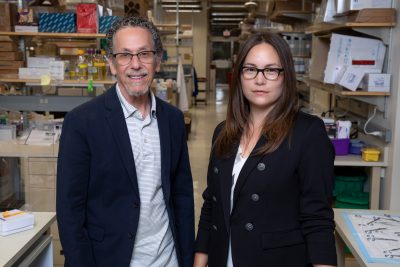
December 17, 2021
LA JOLLA—Professor Ronald Evans and Assistant Professor Dannielle Engle have been granted a 2021 ASPIRE (Accelerating Scientific Platforms and Innovative Research) award to study the cellular and molecular drivers of pancreatic cancer, one of the deadliest cancers with few effective treatment options. The $250,000 award, supported by the Mark Foundation for Cancer Research, enables innovative approaches to solving impactful problems in cancer research. The 23 scientists chosen to lead 2021 ASPIRE projects represent disciplines across the spectrum of cancer research at top academic institutions worldwide.

Click here for a high-resolution image.
Credit: Salk Institute
“With the support of the ASPIRE award, Ron and Dannie will take a novel approach to uncover what is driving pancreatic cancer,” says Salk President Rusty Gage. “Their work will hopefully fuel new avenues of pancreatic cancer research and lead to new, more-effective treatment options for those experiencing the disease.”
Pancreatic cancer, specifically pancreatic ductal adenocarcinoma, is the third-leading cause of cancer-related deaths in the United States. Abnormal levels of bile acids, which help digest fats, are commonly observed in pancreatic cancer, but scientists are unsure of the significance. Evans and Engle previously found that the sugar CA19-9 causes pancreatitis, the precursor to pancreatic cancer. CA19-9 also plays a role in bile acid signaling, and the scientists believe this mechanism could be driving the progression of pancreatitis to pancreatic cancer. For this project, the team will use liver and pancreatic organoids, three-dimensional clusters of cells in a dish that mimic the tissues from which they were derived, to better understand the cellular and molecular basis of how CA19-9 and bile acids may interact to promote tumor growth. Evans and Engle think this work could lead to the development of new therapies for pancreatic cancer and other gastrointestinal cancers.
Office of Communications
Tel: (858) 453-4100
press@salk.edu
Unlocking the secrets of life itself is the driving force behind the Salk Institute. Our team of world-class, award-winning scientists pushes the boundaries of knowledge in areas such as neuroscience, cancer research, aging, immunobiology, plant biology, computational biology and more. Founded by Jonas Salk, developer of the first safe and effective polio vaccine, the Institute is an independent, nonprofit research organization and architectural landmark: small by choice, intimate by nature, and fearless in the face of any challenge.